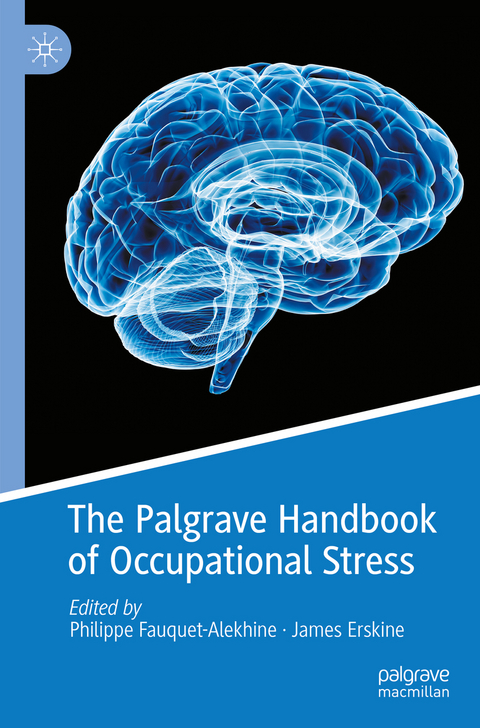
The Palgrave Handbook of Occupational Stress
Springer International Publishing (Verlag)
978-3-031-27351-3 (ISBN)
This handbook brings together an international group of experts to offer a comprehensive resource on occupational stress. Including both theoretical and practical perspectives, it examines ways to reduce and treat stress, as well as the physiological, psychosocial, and neural underpinnings of it. Through 24 original and carefully selected essays, the authors offer new insights, resources, and tools to better understand, manage and treat stress in a professional environment.
The book's chapters are divided into 5 parts that address the conceptualisation of stress; present theoretical models (including the contribution of animal models); examine the psychological and physiological aspects of stress and ways to assess it; delve into psychosocial risks at work and their assessment (means and methods); and investigate how to cope with stress at work, including resilience training. Aspects such as the effects of leadership, simulation training, and stress-tests for hiring are also presented and discussed. The volume ends by exploring broader considerations regarding stress and culture, stress and occupational sectors (with a chapter focusing on studentship), and the pharmacology of stress.
This handbook is an essential reference for researchers in organisational psychology, as well as business and management and education, who are interested in stress. Healthcare workers and therapists who treat stress will also find an invaluable resource in this far-reaching yet accessible collection.
Philippe Fauquet-Alekhine is Technical and Scientific Director at Group INTRA robotics, France, and a member of the SEBE-Lab, Behavioural and Psychological Department of the London School of Economics & Political Science, UK. He has more than 20-year experience in work activity analysis and research applied to human performance within high-risk industries.
James Anthony Keith Erskine is Senior Lecturer at St George's, University of London, UK, and a psychotherapist at the London Hertfordshire Therapy Centre, UK. He has authored numerous academic papers, and book chapters on different methods of coping and their effects. His current research and clinical interests focus on building resilience in individuals and companies. In 2022 Dr Erskine formed a company (Mettleflo Ltd) to further well-being in organisations by providing online training and applications to build resilience.
Part 1 - Stress description.- Chapter I - Introduction.- Chapter II - Conceptualization of Stress.- Chapter III - The Cycle of Stress.- Chapter IV - Animal models in neuroscience: A focus on stress.- Part II - Stress assessment,- Chapter V - Physiological assessment of the state of mental stress at work.- Chapter VI - Psychological assessment of the state of mental stress at work.- Chapter VII - Stress Assessment in Daily Life Using the Experience Sampling Method.- Chapter VIII - Psychosocial risks at work: fundamentals and stakes.- Chapter IX - Psychosocial risks at work: Outlines of the evaluation approach.- Chapter X - Assessment of Psychosocial Risks: methods.- Chapter XI - Assessment of Psychosocial Risks: questionnaire review.- Chapter XII - Visualizing results of a Psychosocial Risks assessment through questionnaires.- Part III - Using stress at work.- Chapter XIII - Leadership styles: work stress andrelated outcomes - health outcomes.- Chapter XIV- Leadership styles and related outcomes - practical suggestions.- Chapter XV - Occupational training, competencies and stress.- Chapter XVI - Stress adjustment as a criterion for hiring in high-risk jobs.- Part IV - Macro description of stress.- Chapter XVII - Cross-cultural ideas on stress.- Chapter XVIII - Stress in different professional sectors.- Chapter XIX - The impact of stress among undergraduate students: supporting resilience and wellbeing early in career progression.- Part V - Dealing with stress.- Chapter XX - Stress Prevention Measures in the Workplace.- Chapter XXII - Stress and resilience in the workplace.- Chapter XXIII - Pharmacology for stress.- Chapter XXIV - Conclusion.
| Erscheinungsdatum | 29.08.2024 |
|---|---|
| Zusatzinfo | XXX, 510 p. 69 illus., 4 illus. in color. |
| Verlagsort | Cham |
| Sprache | englisch |
| Maße | 155 x 235 mm |
| Gewicht | 809 g |
| Themenwelt | Geisteswissenschaften ► Psychologie ► Arbeits- und Organisationspsychologie |
| Medizin / Pharmazie ► Medizinische Fachgebiete ► Psychiatrie / Psychotherapie | |
| Wirtschaft ► Betriebswirtschaft / Management | |
| Schlagworte | Allostatic Load • Burnout • Chronic Fatigue • Leadership Psychology • Management of stress • Occupational stress • psychosocial stress • Resilience • the stress cycle • workplace stress |
| ISBN-10 | 3-031-27351-6 / 3031273516 |
| ISBN-13 | 978-3-031-27351-3 / 9783031273513 |
| Zustand | Neuware |
| Haben Sie eine Frage zum Produkt? |
aus dem Bereich


